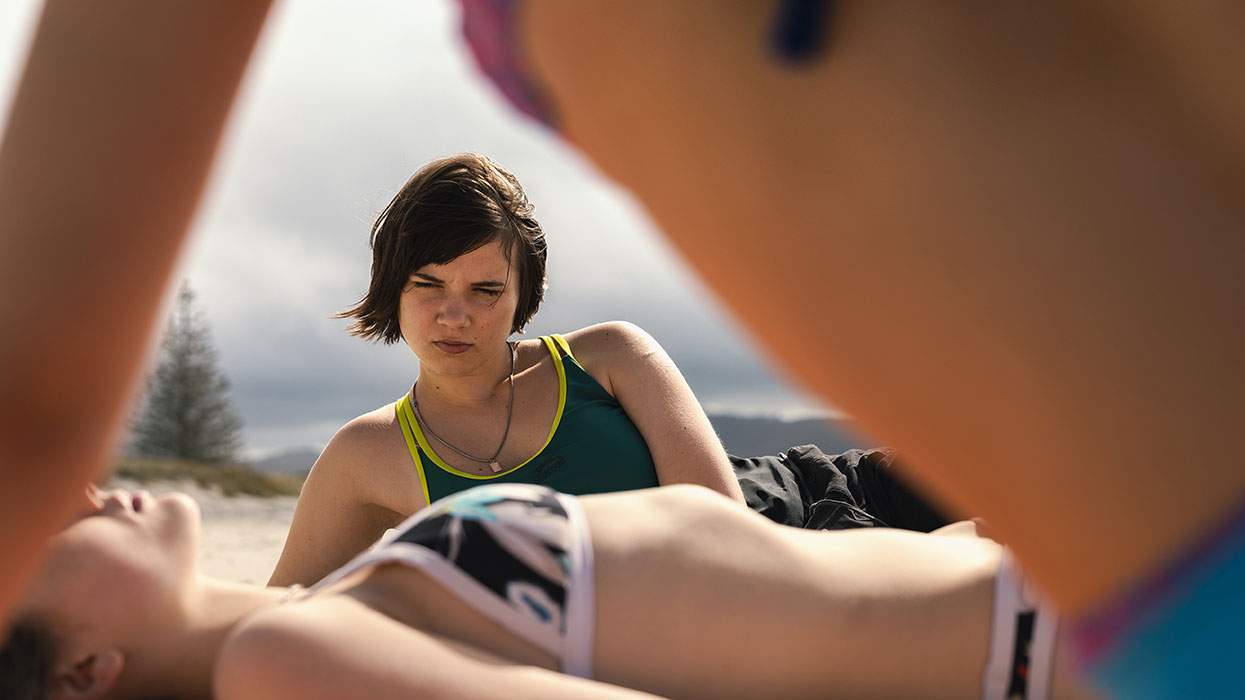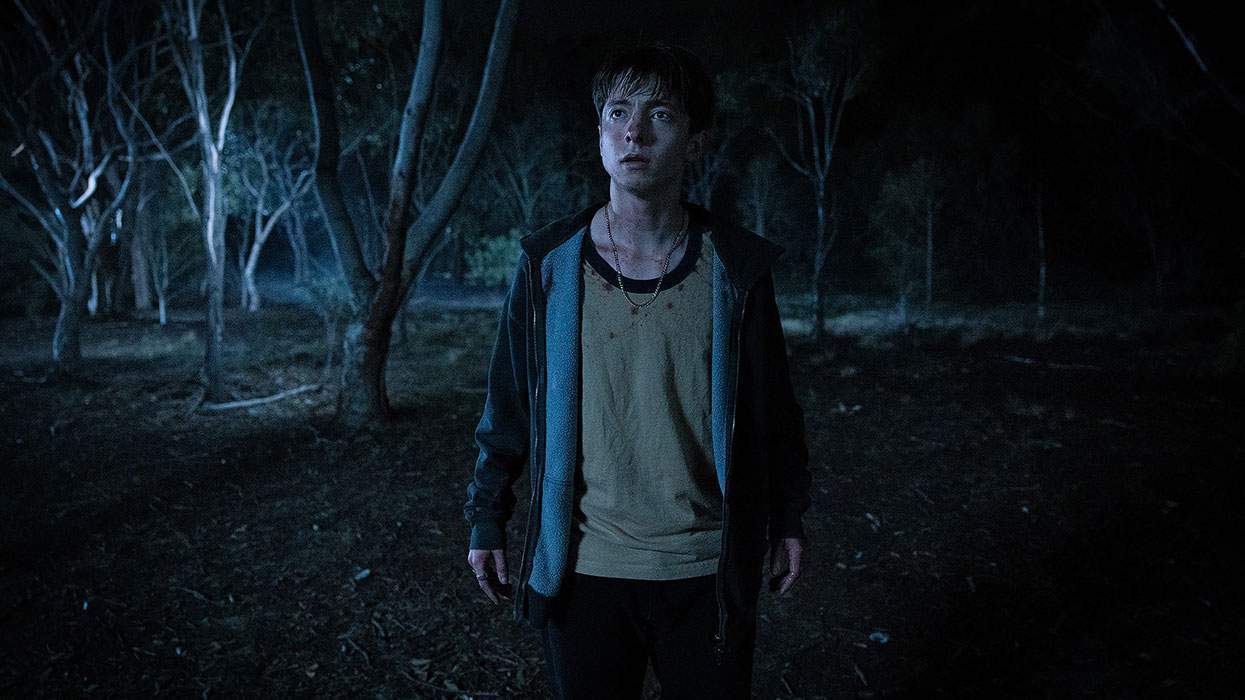In many ways, the short film Love the Sinner is a coming-out story for one of its directors. Jessica Devaney (Speed Sisters) is queer. However, the focus for the filmmaker -- a vocal activist against xenophobia, racism, and homophobia and a founder of the Queer Producers Collective -- is not her sexuality. It is her faith. A former evangelical Christian, Devaney once marched with the "moral majority" against women's rights, gay rights, and many other causes she now champions.
Looking back, Devaney said it is harder to discuss this history in the present day than it was to come out of the closet.
"It was something I was really ashamed of, things I had been a part of for a while, because I was all in, you know?" said Devaney, who once took a True Love Waits pledge and had an Ichthys, or "Jesus fish," tattoo. "I think I had to go through my own journey of reconciling what it was that connected me to the church ... in terms of ethics and values and finding a place for what it meant in my own path before I could start talking about it freely."
Codirected by Geeta Gandbhir (A Journey of a Thousand Miles: Peacekeepers), Love the Sinner, a powerful short documentary that premiered at the Tribeca Film Festival this year, charts this homecoming for Devaney, who at age 34 returned to visit the religious community in Orlando she left behind, searching for answers and speaking with some of its leaders about the systemic problem of prejudice. It's a story that may have never been told as a film -- and a journey that may not have ever been made -- were it not for the Pulse shooting last year, and what Devaney saw as a troubling narrative that arose from it.
"When the shooting at Pulse happened, I was really disturbed by seeing how the narrative was quickly becoming one about so-called Islamic terrorism and really sort of skipping over the very Christian and very homophobic environment of Florida," Devaney said. "I grew up there, and it felt so present to me, and I was just wondering, why isn't that environment part of the story of what's going on here? There's so much fixation on the identity of the killer rather than the context that created him."
Devaney approached Gandbhir with an idea for a short film, a narrative that would tell a truer story of the roots of homophobia and the devastation that such stigma can cause in a community. Gandbhir, after hearing Devaney's story of being queer with a secret evangelical past, recognized the great potential of showing a point of view from someone with such "incredible access to such diverse communities."
"She opened the door to an angle into this story that has really not been seen previously," said Gandbhir, who urged Devaney to be personal in the film's narrative.
And personal it is. Devaney recounts her past from the first person, revealing that faith was both a source of comfort and conflict for her family.
"I found security in the cocoon of fundamentalism. My mother and I had nothing then, but it didn't matter. I had found absolute truth," Devaney says in the film, which tells how her mother, Dawn Seymour, found refuge in religion after fleeing a violent relationship.
Eventually, Devaney also tells of how her faith began to "splinter" when she was confronted with its darker side, including its antiwoman, antigay, and anti-Muslim sentiments. As Devaney remarks in the documentary, "They teach a tolerance of LGBT folks that rejects us with open arms." Eventually, the splinter turned into a split. She left the church and became a progressive activist.
However, her mother, who is featured in the documentary, stayed and was forced to reckon with a faith that preached a negative message about her children. Besides Jessica, she has a son who is gay -- and who texted her after Pulse to let her know he was OK.
"It's hard to worship with people who wouldn't accept the people who I love," the torn mother states in the documentary.
Their relationship illustrates a common one for LGBT people who leave the religious fold but have family members who don't -- a situation that creates a rift. For Devaney, opening this conversation with her mother was one of the highlights of creating this production. It allowed her to "really see the layers of pain that she's holding, really wanting to be part of this faith community and really wanting to be a part of her kids' lives in a meaningful way, and how the love for both creates this crack in her that I just walked away from."
For Gandbhir, Devaney's mother also provided an access point for viewers -- parents, in particular, who are grappling with these issues. The tragedy of Pulse, which happened in their backyard, made the risks of not tackling them all the more real.
"The idea of her being a parent and having this struggle of feeling like your children may be unsafe, and that being the most heartbreaking, terrifying thing to live with is a universal concept," Gandbhir said. "I'm a parent myself. Her mother, watching her mother be so honest, is probably the most heartbreaking and connective part of the film."
In the documentary, Devaney has conversations with two religious leaders about the acceptance of LGBT people in their faith communities. The first is Brent Elliott, the leader of her former church. His remarks indicate he is not awakened to progressive views on LGBT people, nor has he evolved much in his thinking about them.
"What does the Bible say? A person who is living a homosexual lifestyle in our eyes is not honoring God just as much as a person who is a habitual liar or a habitual alcoholic or a person who abuses his wife or abuses his kids," he tells Devaney in an interview.
This philosophy, as Devaney sums up and is reflected in the title, is "Love the sinner and hate the sins." It's a mind-set that Devaney argues is complicit in creating an atmosphere that engenders violence against LGBT people and other vulnerable groups.
The documentary opened her eyes even more to the "collective responsibility for creating a culture of violence, whether that's against women, queer folk, people of color, etc.," she said. "And the largely white evangelical community that I come from plays a role in a lot of kinds of violence, even from a very well-meaning and love-driven place."
"The more conservative pastor in the film is a loving, caring person and doesn't see what he's saying as violent or destructive," she said. "I was sort of shocked that he was still in that place. The world has changed so much in the last 20 years since I was active in that church, and that church has changed so little."
The presidential election and the wave of anti-LGBT hate crimes that followed also added an urgency during the editing of the production, pertaining to the message that Devaney and Gandbhir wanted to send. After all, many LGBT people felt betrayed by their families after Donald Trump's win -- and having conversations that include issues like faith and acceptance has never been more vital.
"What do we need to communicate with our families to get them to make different choices in the future and to understand the implications of these choices directly on our lives?" Devaney asked.
Devaney also hoped to send a message to LGBT people. They must not be fooled by the "divide and conquer" tactics utilized by the Trump administration, which has used tragedies like the Pulse shooting to advance an anti-Muslim agenda, including the travel ban.
"Islamophobia and homophobia are rooted in the same thing. And by trying to pit us against each other, they can pile up more strength for themselves. It's a tactic that's been used against marginalized communities forever," she cautioned.
And in terms of The Resistance against oppression from the current administration, "the organizing that we're doing must be intersectional across queer folks, people of color, marginalized communities in general," she stressed.
Of course, in order for change to take place, it requires action. Gandbhir, in observing Devaney's journey, saw an example for others who wish to confront bias.
"To watch Jessica confront that was incredibly powerful," Gandbhir said. "It's something that ultimately we all need to do on different levels."
"We all have a struggle to find our place in this fight against systemic and structural racism, homophobia, xenophobia -- all the issues kind of affecting us," she continued. "But the hardest thing to do is to look in the mirror and say, 'What do I have to change about myself and my life, and how can I reach out to my community -- and perhaps a community you may not consider yourselves a part of any more? But what can I do with those that I have access to, to make a difference?'"
By reaching across the divide to her old community, Devaney succeeds in effecting change. In interviewing Dr. Joel Hunter, the senior pastor at Northland Church, Devaney forces him to rethink his stance on LGBT issues, particularly in the wake of tragedies like Pulse.
"There are some things that happen, and they make you change," Hunter says in the documentary. "All of us now are realizing what a cold and dead term 'tolerance' is. How almost cruel -- that term that used to seem like it was compassionate is now dismissive."
The change "will have to come from people like me who say, 'I'm the problem,'" he said, a lesson he brought back to his own parishioners. This act was in and of itself a small miracle for the filmmakers.
"Jessica's interaction with this man? There was a spark. And then that sparked was carried to the church," Gandbhir said, concluding, "Eventually a spark could become a fire. And that's what you hope for."















Charlie Kirk DID say stoning gay people was the 'perfect law' — and these other heinous quotes
These are some of his worst comments about LGBTQ+ people made by Charlie Kirk.